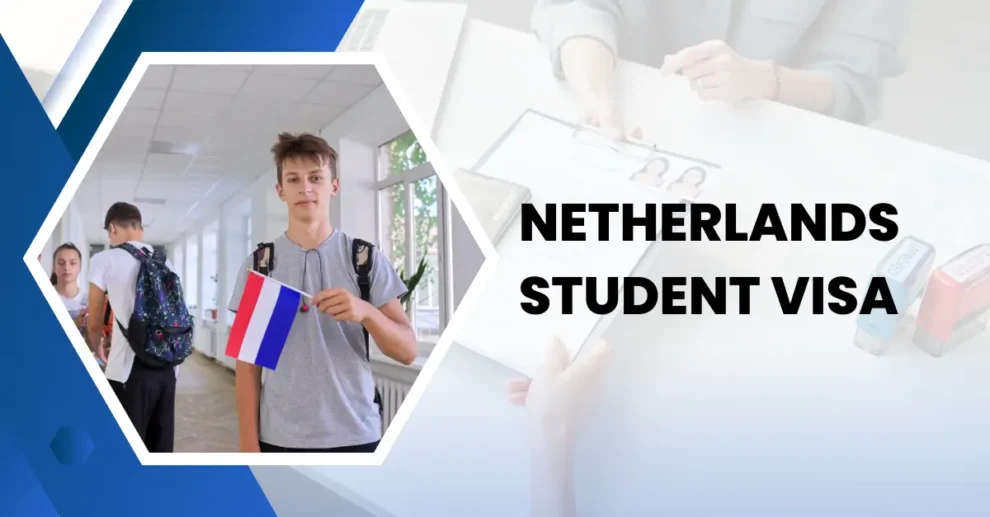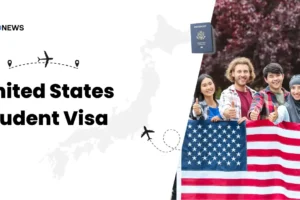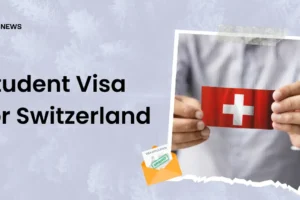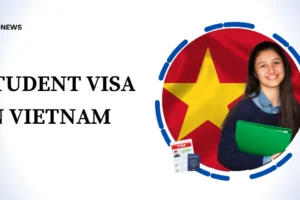If you have decided to study in the Netherlands then you are at the right place. Your first step would be to apply for the Netherlands student visa. Applying for a visa is the most important part of your study abroad journey.
Table of Contents
Most students don’t find it easy and yes it takes a lot of time to gather all the documents you need. But don’t worry too much about it. Applying for a Netherlands student visa is not too hard. Also, not all international students have to apply for it.
In this article, we will learn more about the Netherlands student visa, eligibility criteria, application process, visa fee and processing time, documents required, and more. So, let’s get started.
Key Takeaways
- To study in the Netherlands, you will need an acceptance letter from a Dutch university for your visa application
- EU/EEA citizens and some other countries like Australia, Canada, Japan, and the US do not need a student visa or residence permit
- Non-EU/EEA students require a short-stay visa or Schengen visa for stays under 90 days and an entry visa (MVV) with a residence permit (VVR) for longer stays
- You must prove your English proficiency through tests like PTE Academic, IELTS Academic, TOEFL iBT, or Duolingo
- The university usually handles the residence permit application
- You must register at the city municipal corporation upon arrival
- The Netherlands student visa application process can vary on whether you need an MVV or not
- Processing time for a Netherlands student visa can take up to three months
- You can work up to 16 hours while studying in the Netherlands
- If your Netherlands student visa application is rejected, you can appeal within four weeks after receiving the rejection letter
How To Get Your Acceptance Letter from the Dutch University?
If you are not sure where to study in the Netherlands, you need to decide before applying for a Netherlands student visa. Once you are accepted at a Dutch university, they will give you an acceptance letter you will need for your visa application.
If you need a visa, your university will start the application process. If they don’t, please reach out to them for help. Once the Immigration Service approves your application, your university will let you know. Then, you must find the nearest embassy or consulate in your country to apply for the entry visa (MVV).
Best Universities in the Netherlands
Here are some best universities in the Netherlands offering top-notch education:
- Utrecht University
- Eindhoven University of Technology
- Radboud University
- Wageningen University
- Erasmus University Rotterdam
- Tilburg University
- University of Twente
Netherlands Student Visa Vs Residence Permit
EU/EEA Countries
If you are from the EU/EEA or other countries like Australia, Canada, Japan, and the US, you won’t need a student visa or residence permit to study in the Netherlands.
Other Countries
If you are studying for 90 days or less, you will need a short-stay visa or Schengen visa.
For a longer duration, more than 90 days, you will need an entry visa (MVV) and a residence permit (VVR). The MVV is valid for 90 days, and then you will need to apply for a VVR.
Important Details About The Residence Permit (VVR)
Here are some important things that you should keep in mind about the residence permit (VVR):
- If you decide to change to a new course during your studies, the time you have already spent studying will be subtracted from the total duration of the new course.
- You can apply to extend your stay for the remaining period of your new program before your residence permit expires.
- If your academic performance falls below a certain level, for example, you did not earn at least 50 percent of the required credits each year, your residence permit will be terminated.
- If you stop studying or don’t have enough money to support yourself, the university must inform the Dutch Immigration and Naturalization Service (IND). This can also lead to the cancellation of your visa or residence permit.
Netherlands Student Visa Requirements
Here is what you need to get your Netherlands student visa:
- Fill out the visa application form
- A valid passport
- Two passport-sized photos
- A birth certificate
- Your academic records
- Acceptance letter from your university
- A letter explaining why you want to study your chosen subject
- Bank statements or financial statements
- Travel and health insurance
- Visa processing fee
- Copies of all your documents
- A tuberculosis test if needed
- Your biometric data
Language Requirements for Studying in the Netherlands
Before you start studying in the Netherlands, you need to show that you have a good level of English. You need to show that you have a good command of English as well as the Dutch language.
There are different tests you can take to prove your English skills. Some of the main ones are:
- PTE Academic
- IELTS Academic
- TOEFL iBT
- Duolingo
How To Get a Residence Permit in the Netherlands?
When you go to study in the Netherlands, the university will usually handle your residence permit application for you, but they may charge you for this service.
This residence permit acts like a study visa. It lets you stay in the country for your whole study program. You can also extend it for another three months if necessary.
Once you are in the Netherlands, you need to register at the municipal corporation in the city where you will be living.
When and Where To Apply For a Student Visa for the Netherlands?
Your university should begin the application process. If they have not, you should reach out to them directly. Once the university’s request is approved, you can apply for an entry visa at your local embassy or consulate.
You can pick up the MVV within three months. The visa application usually takes about a month to process. But this can vary from person to person. It depends on your nationality and other factors.
How To Apply For a Netherlands Student Visa?
Here is how you can apply for a Netherlands student visa:
a. Application Process with MVV
When you apply with MVV, you should follow the following steps:
- You give your basic information and pay €171 to your university
- You will get a receipt from the university
- When the Immigration Office approves your application, you can make an appointment at the Dutch embassy
- At the appointment, you should give your information and show your passport
- Then, you can go to the Netherlands with your MVV for 90 days
- After that, you will get your residence permit usually in two weeks
- Once you get the residence permit (VVR), you should register yourself in the municipal corporation in the city where you will study
- You should get a TB test done if needed
b. Application Process without MVV
When you don’t need an MVV, here is what you need to do:
- Your chosen school will apply for your permit.
- Once you get a decision, you can go to the Netherlands.
- There, you can collect your permit from the IND desk.
- Remember to sign up at the city where you will study.
Netherlands Student Visa Fee
When you apply for a visa in the Netherlands, it usually costs about €210 for international students. But the exact fee might vary. It depends on additional charges like service or handling fees. You should check with your university to know the exact amount.
Most universities include the Visa Application Fee in their Fee Schedule. This fee needs to be paid to confirm your enrollment with the university. You should check your university’s Fee Schedule to know more about it.
Netherlands Student Visa Processing Time
If you are planning to get your MVV and residence permit to study in the Netherlands it can take up to three months. But in most cases, it is usually faster than that.
You should start your application as soon as possible because it can take a few weeks to process. If you wait until the last minute and miss any documents, it could lead to a delay in your visa.
Can You Work While Studying in the Netherlands?
If you are studying in the Netherlands and want to work, you might need a work permit depending on where you are from. As an international student, you can work up to 16 hours a week, or full-time during the summer months.
If you are from the EU/EEA (except Croatia), Switzerland, or Japan, you don’t need a work permit. There is no limit to how many hours you can work. But if you are from Croatia or other countries, you will need a work permit. Only your employer can apply for it for you.
Netherlands Student Visa Work Hours
When you work part-time while studying in the Netherlands, you should make sure your employer has a TWV permit for you. With this, you can work up to 16 hours a week, or full-time during June, July, and August.
If you want to work for yourself while studying, that is also acceptable. But you should meet the educational requirements for your residence permit. You don’t need a TWV permit to work for yourself. You can work as many hours as you want.
Scholarships For Studying in the Netherlands
If you are thinking about studying in Europe then the Netherlands is a popular choice for many international students. Many students from around the world come to Dutch universities to learn.
But, studying abroad can be expensive, with tuition fees and living costs. That is why Dutch universities offer scholarships to help their students out. Here are some of the top scholarships you can apply for while studying in the Netherlands:
- Amsterdam Merit Scholarships (Faculty of Science)
- Ritchie-Jennings Memorial Scholarship
- Golden Key Graduate Scholar Award
- (ISC)² Women in Information Security Scholarships
What To Do If Your Netherlands Student Visa is Rejected?
If your student visa for the Netherlands gets rejected, you will get a letter telling you the reason behind it. You will have 4 weeks to write a letter back if you disagree with their decision.
The letter will tell you where you need to send your objection. If you forgot to include something in your application, like a document, you can fix it by sending in a new application.
Frequently Asked Questions
1. How much money is required for a Netherlands student visa?
When you are applying for a student visa to the Netherlands, you need to make sure you have enough money. You will need about €11,100 for living expenses for one year. You must also be able to afford the tuition fees for your university.
2. Can you work in the Netherlands with a student visa?
If you are living in the Netherlands with a student permit, you can work for up to 16 hours every week. During the summer months from June to August, you can work full-time as well.
3. Do US citizens need a student visa for the Netherlands?
If you are staying in the Netherlands for more than 90 days, like many U.S. passport holders, you will need to get a residence permit instead of just a visa. Before you leave, please make sure to gather and send all the immigration papers your university needs from you.
4. Is it hard to get a Netherlands student visa?
It might take some time but it’s not hard. It takes around 30 to 120 days for your Netherlands student visa to get processed. If all the required documents are not in order, the process could take even longer. But don’t worry too much about it. The Netherlands is known for being very friendly to their students. Most students get their visas approved easily. They have a high success rate of 98%.
5. How expensive is the Netherlands for international students?
Living costs for international students in the Netherlands usually range from €800 to €1200 per month. When you are looking for a place to stay, you will find that rooms can cost between €300 and €600 on average. Please remember that prices can vary. It depends on whether you are in a city or a small town. The rent you pay also depends on the type of accommodation you choose.
Conclusion
To apply for a Netherlands student visa, you will need to gather and submit all the important documents. You will also need to fill out a visa application form and provide your academic transcripts.
The MVV takes about 60 days to process, and the VVR takes around 2 weeks. You should apply for your visa at least 3 months before your course starts.
As an international student, you can work part-time in the Netherlands. You can either work up to 16 hours per week all year round or work full-time during June, July, and August. Your employer will handle the work permit for you.
You must have all the required documents and you must show a bank statement to show that you can support yourself during the course duration. Doing all these steps right can improve your chances of getting the Netherlands student visa easily.












Add Comment